formerly eScholarship Editions


|
|
|
|
Your search for
'Philosophy' in subject
found 100 book(s). | Modify Search | Displaying 81 - 100 of 100 book(s) | |
| 81. | 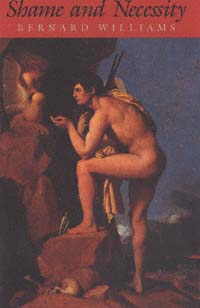 | Title: Shame and necessity Author: Williams, Bernard Arthur Owen Published: University of California Press, 1993 Subjects: Philosophy | Ethics | Classics | Classical Philosophy | Literary Theory and Criticism Publisher's Description: We tend to suppose that the ancient Greeks had primitive ideas of the self, of responsibility, freedom, and shame, and that now humanity has advanced from these to a more refined moral consciousness. Bernard Williams's original and radical book questions this picture of Western history. While we are in many ways different from the Greeks, Williams claims that the differences are not to be traced to a shift in these basic conceptions of ethical life. We are more like the ancients than we are prepared to acknowledge, and only when this is understood can we properly grasp our most important differences from them, such as our rejection of slavery.The author is a philosopher, but much of his book is directed to writers such as Homer and the tragedians, whom he discusses as poets and not just as materials for philosophy. At the center of his study is the question of how we can understand Greek tragedy at all, when its world is so far from ours.Williams explains how it is that when the ancients speak, they do not merely tell us about themselves, but about ourselves. Shame and Necessity gives a new account of our relations to the Greeks, and helps us to see what ethical ideas we need in order to live in the modern world. [brief] Similar Items |
| 82. | 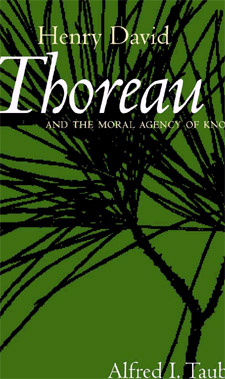 | Title: Henry David Thoreau and the moral agency of knowing Author: Tauber, Alfred I Published: University of California Press, 2001 Subjects: Philosophy | Literature | History and Philosophy of Science | Ethics Publisher's Description: In his graceful philosophical account, Alfred I. Tauber shows why Thoreau still seems so relevant today - more relevant in many respects than he seemed to his contemporaries. Although Thoreau has been skillfully and thoroughly examined as a writer, naturalist, mystic, historian, social thinker, Transcendentalist, and lifelong student, we may find in Tauber's portrait of Thoreau the moralist a characterization that binds all these aspects of his career together. Thoreau was caught at a critical turn in the history of science, between the ebb of Romanticism and the rising tide of positivism. He responded to the challenges posed by the new ideal of objectivity not by rejecting the scientific worldview, but by humanizing it for himself. Tauber portrays Thoreau as a man whose moral vision guided his life's work. Each of Thoreau's projects reflected a self-proclaimed "metaphysical ethics," an articulated program of self-discovery and self-knowing. By writing, by combining precision with poetry in his naturalist pursuits and simplicity with mystical fervor in his daily activity, Thoreau sought to live a life of virtue - one he would characterize as marked by deliberate choice. This unique vision of human agency and responsibility will still seem fresh and contemporary to readers at the start of the twenty-first century. [brief] Similar Items |
| 83. | 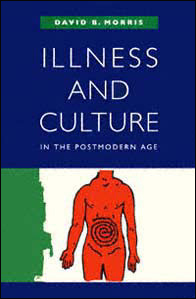 | Title: Illness and culture in the postmodern age Author: Morris, David B Published: University of California Press, 1998 Subjects: Sociology | Philosophy | Medicine | Technology and Society | Anthropology | American Studies Publisher's Description: We become ill in ways our parents and grandparents did not, with diseases unheard of and treatments undreamed of by them. Illness has changed in the postmodern era - roughly the period since World War II - as dramatically as technology, transportation, and the texture of everyday life. Exploring these changes, David B. Morris tells the fascinating story, or stories, of what goes into making the postmodern experience of illness different, perhaps unique. Even as he decries the overuse and misuse of the term "postmodern," Morris shows how brightly ideas of illness, health, and postmodernism illuminate one another in late-twentieth-century culture.Modern medicine traditionally separates disease - an objectively verified disorder - from illness - a patient's subjective experience. Postmodern medicine, Morris says, can make no such clean distinction; instead, it demands a biocultural model, situating illness at the crossroads of biology and culture. Maladies such as chronic fatigue syndrome and post-traumatic stress disorder signal our awareness that there are biocultural ways of being sick.The biocultural vision of illness not only blurs old boundaries but also offers a new and infinitely promising arena for investigating both biology and culture. In many ways Illness and Culture in the Postmodern Age leads us to understand our experience of the world differently. [brief] Similar Items |
| 84. | 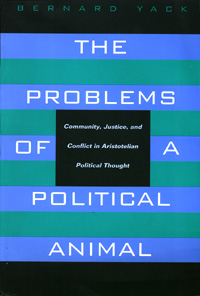 | Title: The problems of a political animal: community, justice, and conflict in Aristotelian political thought Author: Yack, Bernard 1952- Published: University of California Press, 1993 Subjects: Politics | Philosophy | Political Theory | Social and Political Thought | Social Theory Publisher's Description: A bold new interpretation of Aristotelian thought is central to Bernard Yack's provocative new book. He shows that for Aristotle, community is a conflict-ridden fact of everyday life, as well as an ideal of social harmony and integration. From political justice and the rule of law to class struggle and moral conflict, Yack maintains that Aristotle intended to explain the conditions of everyday political life, not just, as most commentators assume, to represent the hypothetical achievements of an idealistic "best regime."By showing how Aristotelian ideas can provide new insight into our own political life, Yack makes a valuable contribution to contemporary discourse and debate. His work will excite interest among a wide range of social, moral, and political theorists. [brief] Similar Items |
| 85. | 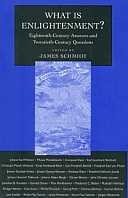 | Title: What is Enlightenment?: eighteenth-century answers and twentieth-century questions Author: Schmidt, James Published: University of California Press, 1996 Subjects: Philosophy | Social and Political Thought | Intellectual History | German Studies Publisher's Description: This collection contains the first English translations of a group of important eighteenth-century German essays that address the question, "What is Enlightenment?" The book also includes newly translated and newly written interpretive essays by leading historians and philosophers, which examine the origins of eighteenth-century debate on Enlightenment and explore its significance for the present.In recent years, critics from across the political and philosophical spectrum have condemned the Enlightenment for its complicity with any number of present-day social and cultural maladies. It has rarely been noticed, however, that at the end of the Enlightenment, German thinkers had already begun a scrutiny of their age so wide-ranging that there are few subsequent criticisms that had not been considered by the close of the eighteenth century. Among the concerns these essays address are the importance of freedom of expression, the relationship between faith and reason, and the responsibility of the Enlightenment for revolutions.Included are translations of works by such well-known figures as Immanuel Kant, Moses Mendelssohn, Johann Gottlieb Fichte, and Johann Georg Hamann, as well as essays by thinkers whose work is virtually unknown to American readers. These eighteenth-century texts are set against interpretive essays by such major twentieth-century figures as Max Horkheimer, Jürgen Habermas, and Michel Foucault. [brief] Similar Items |
| 86. |  | Title: Abuses Author: Lingis, Alphonso 1933- Published: University of California Press, 1994 Subjects: Philosophy | Literature | Cultural Anthropology | Social and Political Thought | Psychology | Travel Publisher's Description: Part travelogue, part meditation, Abuses is a bold exploration of central themes in Continental philosophy by one of the most passionate and original thinkers in that tradition writing today.A gripping record of desires, obsessions, bodies, and spaces experienced in distant lands, Alphonso Lingis's book offers no less than a new approach to philosophy - aesthetic and sympathetic - which departs from the phenomenology of Levinas and Merleau-Ponty. "These were letters written to friends," Lingis writes, "from places I found myself for months at a time, about encounters that moved me and troubled me. . . . These writings also became no longer my letters. I found myself only trying to speak for others, others greeted only with passionate kisses of parting."Ranging from the elevated Inca citadel of Machu Picchu, to the living rooms of the Mexican elite, to the streets of Manila, Lingis recounts incidents of state-sponsored violence and the progressive incorporation of third-world peoples into the circuits of exchange of international capitalism. Recalling the work of such writers as Graham Greene, Kathy Acker, and Georges Bataille, Abuses contains impassioned accounts of silence, eros and identity, torture and war, the sublime, lust and joy, and human rituals surrounding carnival and death that occurred during his journeys to India, Bangladesh, Thailand, Bali, the Philippines, Antarctica, and Latin America. A deeply unsettling book by a philosopher of unusual imagination, Abuses will appeal to readers who, like its author, "may want the enigmas and want the discomfiture within oneself." [brief] Similar Items |
| 87. | 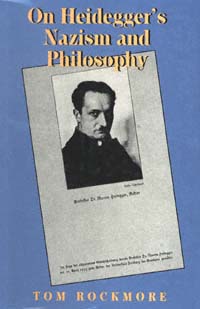 | Title: On Heidegger's Nazism and philosophy Author: Rockmore, Tom 1942- Published: University of California Press, 1991 Subjects: Philosophy | Social and Political Thought | German Studies | Intellectual History Publisher's Description: That Martin Heidegger supported National Socialism has long been common knowledge. Yet the relation between his philosophy and political commitments remains highly contentious and recently has erupted into a vociferous debate. Boldly refuting arguments that the philosopher's political stance was accidental or adopted under coercion, Rockmore argues that Heidegger's philosophical thought and his Nazism are inseparably intertwined, that he turned to National Socialism on the basis of his philosophy, and that his later evolution is largely determined by his continuing concern with Nazism.After developing a framework that clearly outlines the interrelation of Nazism and Heidegger's philosophy, Rockmore analyzes the famous rectoral address the philosopher delivered in 1933 upon becoming rector of the University of Freiburg. In that speech Heidegger sought to ground politics in philosophy. Rockmore examines the inseparable relation of politics and philosophy in Heidegger's Being and Time , the recently published Contributions to Philosophy (written from 1936 to 1938), and the interpretations of Hölderlin, Nietzsche, and technology.In his conclusion Rockmore considers the ongoing discussion of Heidegger's thought and Nazism in France. Combining extensive documentation of the Heidegger controversy with philosophical and historical analysis, this book raises profound questions about the social and political responsibility of philosophy. [brief] Similar Items |
| 88. | 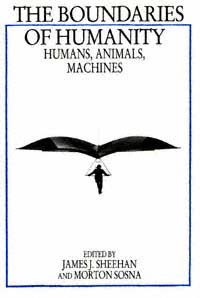 | Title: The Boundaries of humanity: humans, animals, machines Author: Sheehan, James J Published: University of California Press, 1991 Subjects: Philosophy | History and Philosophy of Science | Biology | Technology and Society Publisher's Description: To the age-old debate over what it means to be human, the relatively new fields of sociobiology and artificial intelligence bring new, if not necessarily compatible, insights. What have these two fields in common? Have they affected the way we define humanity? These and other timely questions are addressed with colorful individuality by the authors of The Boundaries of Humanity .Leading researchers in both sociobiology and artificial intelligence combine their reflections with those of philosophers, historians, and social scientists, while the editors explore the historical and contemporary contexts of the debate in their introductions. The implications of their individual arguments, and the often heated controversies generated by biological determinism or by mechanical models of mind, go to the heart of contemporary scientific, philosophical, and humanistic studies. [brief] Similar Items |
| 89. |  | Title: Rethinking evil: contemporary perspectives Author: Lara, María Pía Published: University of California Press, 2001 Subjects: Philosophy | Ethics | Social and Political Thought | Intellectual History | Social Theory | Social Problems Publisher's Description: This innovative volume will be welcomed by moral and political philosophers, social scientists, and anyone who reflects seriously on the twentieth century's heavy burden of war, genocide, ethnic cleansing, and other evidence of people's desire to harm one another. María Pía Lara brings together a provocative set of essays that reexamine evil in the context of a "postmetaphysical" world, a world that no longer equates natural and human evil and no longer believes in an omnipotent God. The question of how and why God permits evil events to occur is replaced by the question of how and why humans perform radically evil acts. [brief] Similar Items |
| 90. |  | Title: Dear Carnap, dear Van: the Quine-Carnap correspondence and related work Author: Carnap, Rudolf 1891-1970 Published: University of California Press, 1991 Subjects: Philosophy | History and Philosophy of Science | Autobiographies and Biographies Publisher's Description: Rudolf Carnap and W. V. Quine, two of the twentieth century's most important philosophers, corresponded at length - and over a long period of time - on matters personal, professional, and philosophical. Their friendship encompassed issues and disagreements that go to the heart of contemporary philosophic discussions. Carnap (1891-1970) was a founder and leader of the logical positivist school. The younger Quine (1908-) began as his staunch admirer but diverged from him increasingly over questions in the analysis of meaning and the justification of belief. That they remained close, relishing their differences through years of correspondence, shows their stature both as thinkers and as friends. The letters are presented here, in full, for the first time.The substantial introduction by Richard Creath offers a lively overview of Carnap's and Quine's careers and backgrounds, allowing the nonspecialist to see their writings in historical and intellectual perspective. Creath also provides a judicious analysis of the philosophical divide between them, showing how deep the issues cut into the discipline, and how to a large extent they remain unresolved. Dear Carnap, I enclose a copy of a paper which I am ready to send off for publication. . . . I am anxious to have you look this over as soon as possible, to see whether you have reason to suppose the system contradictory: for it looks dangerous. Dear Quine: I read your paper very carefully and with the highest interest. . . . So far, I do not see any contradiction in the system itself . . . but I share your feeling that the whole looks rather dangerous. [brief] Similar Items |
| 91. | 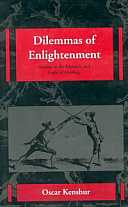 | Title: Dilemmas of enlightenment: studies in the rhetoric and logic of ideology Author: Kenshur, Oscar 1942- Published: University of California Press, 1993 Subjects: Philosophy | Social and Political Thought | Literary Theory and Criticism | European History Publisher's Description: Oscar Kenshur combines trenchant analyses of important early-modern texts with a powerful critique of postmodern theories of ideology. He thereby contributes both to our understanding of Enlightenment thought and to contemporary debates about cultural studies and critical theory.While striving to resolve "dilemmas" occasioned by conflicting intellectual and political commitments, seventeenth- and eighteenth-century writers often relied upon ideas originally used by their enemies to support very different claims. Thus, they engaged in what Kenshur calls "intellectual co-optation." In exploring the ways in which Dryden, Bayle, Voltaire, Johnson, and others used this technique, Kenshur presents a historical landscape distinctly different from the one constructed by much contemporary theory. [brief] Similar Items |
| 92. |  | Title: Politics, death, and the devil: self and power in Max Weber and Thomas Mann Author: Goldman, Harvey Published: University of California Press, 1992 Subjects: Sociology | Social Theory | European History | Literary Theory and Criticism | Political Theory | Philosophy Publisher's Description: This sequel to Harvey Goldman's well-received Max Weber and Thomas Mann continues his rich exploration of the political and cultural critiques embodied in the more mature writings of these two authors. Combining social and political thought, intellectual history, and literary interpretation, Goldman examines in particular Weber's "Science as a Vocation" and "Politics as a Vocation" and Mann's The Magic Mountain and Doctor Faustus .Goldman deals with the ways in which Weber and Mann sought an antidote to personal and cultural weakness through "practices" for generating strength, mastery, and power, drawing primarily on ascetic traditions at a time when the vitality of other German traditions was disappearing. Power and mastery concerned both Weber and Mann, especially as they tried to resolve problems of politics and culture in Germany. Although their resolutions of the problems they confronted seem inadequate, they show the significance of linking social and political thought to conceptions of self and active worldly practices.Trenchant and illuminating, Goldman's book is essential reading for anyone interested in political theory, social thought, and the intellectual history of Germany. [brief] Similar Items |
| 93. | 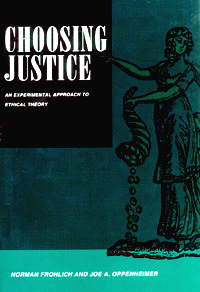 | Title: Choosing justice: an experimental approach to ethical theory Author: Frohlich, Norman Published: University of California Press, 1992 Subjects: Politics | Economics and Business | Philosophy | Political Theory | Social Theory | Ethics Similar Items |
| 94. | 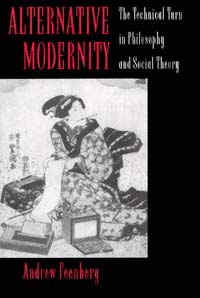 | Title: Alternative modernity: the technical turn in philosophy and social theory Author: Feenberg, Andrew Published: University of California Press, 1995 Subjects: Philosophy | Social and Political Thought | History and Philosophy of Science | Popular Culture Publisher's Description: In this new collection of essays, Andrew Feenberg argues that conflicts over the design and organization of the technical systems that structure our society shape deep choices for the future. A pioneer in the philosophy of technology, Feenberg demonstrates the continuing vitality of the critical theory of the Frankfurt School. He calls into question the anti-technological stance commonly associated with its theoretical legacy and argues that technology contains potentialities that could be developed as the basis for an alternative form of modern society.Feenberg's critical reflections on the ideas of Jürgen Habermas, Herbert Marcuse, Jean-François Lyotard, and Kitaro Nishida shed new light on the philosophical study of technology and modernity. He contests the prevalent conception of technology as an unstoppable force responsive only to its own internal dynamic and politicizes the discussion of its social and cultural construction.This argument is substantiated in a series of compelling and well-grounded case studies. Through his exploration of science fiction and film, AIDS research, the French experience with the "information superhighway," and the Japanese reception of Western values, he demonstrates how technology, when subjected to public pressure and debate, can incorporate ethical and aesthetic values. [brief] Similar Items |
| 95. |  | Title: Downcast eyes: the denigration of vision in twentieth-century French thought Author: Jay, Martin 1944- Published: University of California Press, 1993 Subjects: Philosophy | Intellectual History | French Studies | Literary Theory and Criticism | Art Theory Publisher's Description: Long considered "the noblest of the senses," vision has increasingly come under critical scrutiny by a wide range of thinkers who question its dominance in Western culture. These critics of vision, especially prominent in twentieth-century France, have challenged its allegedly superior capacity to provide access to the world. They have also criticized its supposed complicity with political and social oppression through the promulgation of spectacle and surveillance.Martin Jay turns to this discourse surrounding vision and explores its often contradictory implications in the work of such influential figures as Jean-Paul Sartre, Maurice Merleau-Ponty, Michel Foucault, Jacques Lacan, Louis Althusser, Guy Debord, Luce Irigaray, Emmanuel Levinas, and Jacques Derrida. Jay begins with a discussion of the theory of vision from Plato to Descartes, then considers its role in the French Enlightenment before turning to its status in the culture of modernity. From consideration of French Impressionism to analysis of Georges Bataille and the Surrealists, Roland Barthes's writings on photography, and the film theory of Christian Metz, Jay provides lucid and fair-minded accounts of thinkers and ideas widely known for their difficulty.His book examines the myriad links between the interrogation of vision and the pervasive antihumanist, antimodernist, and counter-enlightenment tenor of much recent French thought. Refusing, however, to defend the dominant visual order, he calls instead for a plurality of "scopic regimes." Certain to generate controversy and discussion throughout the humanities and social sciences, Downcast Eyes will consolidate Jay's reputation as one of today's premier cultural and intellectual historians. [brief] Similar Items |
| 96. |  | Title: Hellenistic philosophy of mind Author: Annas, Julia Published: University of California Press, 1994 Subjects: Classics | Social and Political Thought | Intellectual History | Classical Philosophy | Philosophy | Rhetoric Publisher's Description: Hellenistic Philosophy of Mind is an elegant survey of Stoic and Epicurean ideas about the soul - an introduction to two ancient schools whose belief in the soul's physicality offer compelling parallels to modern approaches in the philosophy of mind. Annas incorporates recent thinking on Hellenistic philosophy of mind so lucidly and authoritatively that specialists and nonspecialists alike will find her book rewarding.In part, the Hellenistic epoch was a "scientific" period that broke with tradition in ways that have an affinity with the modern shift from the seventeenth and eighteenth centuries to the present day. Hellenistic philosophy of the soul, Annas argues, is in fact a philosophy of mind, especially in the treatment of such topics as perception, thought, and action. [brief] Similar Items |
| 97. | 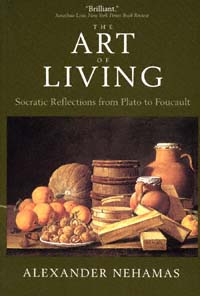 | Title: The art of living: Socratic reflections from Plato to Foucault Author: Nehamas, Alexander 1946- Published: University of California Press, 1998 Subjects: Classics | Classical Philosophy | Classical Literature and Language | Philosophy | Social and Political Thought | Literature Publisher's Description: For much of its history, philosophy was not merely a theoretical discipline but a way of life, an "art of living." This practical aspect of philosophy has been much less dominant in modernity than it was in ancient Greece and Rome, when philosophers of all stripes kept returning to Socrates as a model for living. The idea of philosophy as an art of living has survived in the works of such major modern authors as Montaigne, Nietzsche, and Foucault. Each of these writers has used philosophical discussion as a means of establishing what a person is and how a worthwhile life is to be lived. In this wide-ranging, brilliantly written account, Alexander Nehamas provides an incisive reevaluation of Socrates' place in the Western philosophical tradition and shows the importance of Socrates for Montaigne, Nietzsche, and Foucault.Why does each of these philosophers - each fundamentally concerned with his own originality - return to Socrates as a model? The answer lies in the irony that characterizes the Socrates we know from the Platonic dialogues. Socratic irony creates a mask that prevents a view of what lies behind. How Socrates led the life he did, what enabled or inspired him, is never made evident. No tenets are proposed. Socrates remains a silent and ambiguous character, forcing readers to come to their own conclusions about the art of life. This, Nehamas shows, is what allowed Montaigne, Nietzsche, and Foucault to return to Socrates as a model without thereby compelling them to imitate him.This highly readable, erudite study argues for the importance of the tradition within Western philosophy that is best described as "the art of living" and casts Montaigne, Nietzsche, and Foucault as the three major modern representatives of this tradition. Full of original ideas and challenging associations, this work will offer new ways of thinking about the philosophers Nehamas discusses and about the discipline of philosophy itself. [brief] Similar Items |
| 98. | 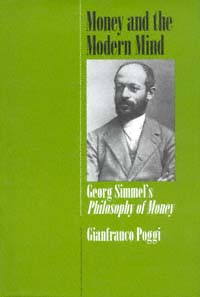 | Title: Money and the modern mind: George Simmel's Philosophy of money Author: Poggi, Gianfranco Published: University of California Press, 1993 Subjects: Social Science | Philosophy | Economics and Business | Social Theory | European Studies Publisher's Description: A major representative of the German sociological tradition, Georg Simmel (1858-1918) has influenced social thinkers ranging from the Chicago School to Walter Benjamin. His magnum opus, The Philosophy of Money , published in 1900, is nevertheless a difficult book that has daunted many would-be readers. Gianfranco Poggi makes this important work accessible to a broader range of scholars and students, offering a compact and systematically organized presentation of its main arguments.Simmel's insights about money are as valid today as they were a hundred years ago. Poggi provides a sort of reader's manual to Simmel's work, deepening the reader's understanding of money while at the same time offering a new appreciation of the originality of Simmel's social theory. [brief] Similar Items |
| 99. | 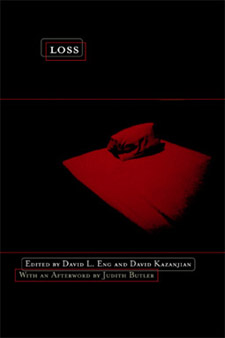 | Title: Loss: the politics of mourning Author: Eng, David L 1967- Published: University of California Press, 2002 Subjects: Literature | American Studies | History | Philosophy | Ethnic Studies | Gender Studies | Cultural Anthropology | Immigration Publisher's Description: Taking stock of a century of pervasive loss - of warfare, disease, and political strife - this eloquent book opens a new view on both the past and the future by considering "what is lost" in terms of "what remains." Such a perspective, these essays suggest, engages and reanimates history. Plumbing the cultural and political implications of loss, the authors--political theorists, film and literary critics, museum curators, feminists, psychoanalysts, and AIDS activists--expose the humane and productive possibilities in the workings of witness, memory, and melancholy. Among the sites of loss the authors revisit are slavery, apartheid, genocide, war, diaspora, migration, suicide, and disease. Their subjects range from the Irish Famine and the Ottoman slaughter of Armenians to the aftermath of the Vietnam War and apartheid in South Africa, problems of partial immigration and assimilation, AIDS, and the re-envisioning of leftist movements. In particular, Loss reveals how melancholia can lend meaning and force to notions of activism, ethics, and identity. [brief] Similar Items |
| 100. | 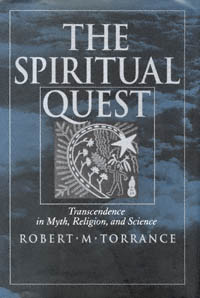 | Title: The spiritual quest: transcendence in myth, religion, and science Author: Torrance, Robert M. (Robert Mitchell) 1939- Published: University of California Press, 1994 Subjects: Religion | Indigenous Religions | Cultural Anthropology | Folklore and Mythology | Language and Linguistics | Philosophy | History and Philosophy of Science | Literature Publisher's Description: Robert Torrance's wide-ranging, innovative study argues that the spiritual quest is rooted in our biological, psychological, linguistic, and social nature. The quest is not, as most have believed, a rare mystical experience, but a frequent expression of our most basic human impulses. Shaman and scientist, medium and poet, prophet and philosopher, all venture forth in quest of visionary truths to transform and renew the world.Yet Torrance is not trying to reduce the quest to an "archetype" or "monomyth." Instead, he presents the full diversity of the quest in the myths and religious practices of tribal peoples throughout the world, from Oceania to India, Africa, Siberia, and especially the Americas. In theorizing about the quest, Torrance draws on thinkers as diverse as Bergson and Piaget, van Gennep and Turner, Pierce and Popper, Freud, Darwin, and Chomsky. This is a book that will expand our knowledge - and awareness - of a fundamental human activity in all its fascinating complexity. [brief] Similar Items |